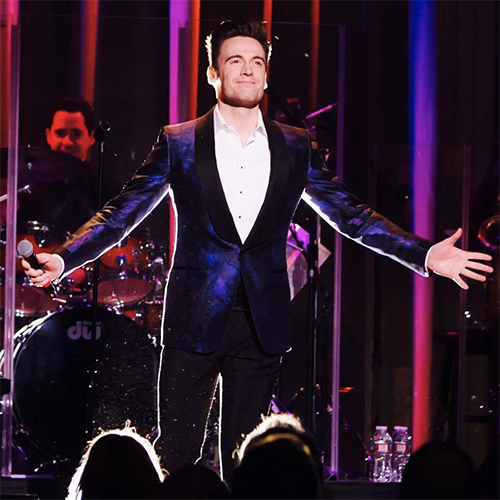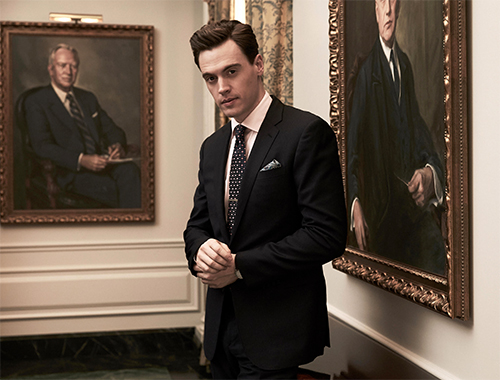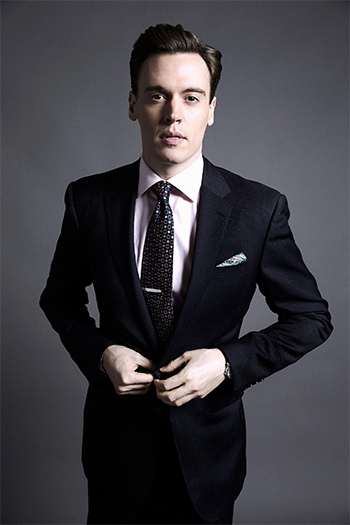by Mike Telin

Erich Bergen is a man of many talents. He starred in the Clint Eastwood film Jersey Boys, reprising his role as Bob Gaudio in the Tony Award-winning stage production. He made his Broadway debut starring opposite Katharine McPhee in the hit musical Waitress. He performed the role of Randy Kroll in the 2018 film Humor Me, and currently stars as Blake Moran on the hit CBS television drama Madam Secretary. A critically acclaimed singer/musician, he performs in concert venues around the world.
I got in touch with Erich Bergen by phone and began by asking him if he has worked with Carl Topilow in the past.
Erich Bergen: We’ve spoken on the phone — I’ve never worked with him, but I have heard a lot about him and I’m thrilled to be doing this. I was on the National Tour of Anything Goes (2012-13) and that opened in Cleveland at the Palace Theater. The audiences were just incredible and I remember their sound distinctly.
Mike Telin: Is “The Hollywood Songbook” the show you created for your performance with the Shreveport Symphony earlier this year?
EB: Yes, but for this one some new songs have been added and we’ve made room for the Orchestra to play some of their music. But it’s the same show. There’s everything from Singin’ in the Rain to some Burt Bacharach, Moon River, Don’t Rain on My Parade, all the way up to Don’t You (Forget About Me) from The Breakfast Club. And of course there will be music from Jersey Boys.
MT: What is it about singing these songs with a symphony orchestra that excites you?
EB: There’s a power and energy that comes from that sound. It’s one thing to have an orchestra underneath you like on Broadway, but to have one behind you, the power that you can literally feel on your back just energizes you as a performer.
I have to say that I don’t tend to get nervous — I’ve always felt more comfortable onstage than I do at a Christmas party. I feel like I have control over a crowd, whatever the occasion calls for. But I remember when I got onstage in Shreveport the first time, I felt completely out of my element — not in a bad way, but I had never felt music in my bones like that. And it was something that I instantly became completely addicted to and wanted to do again. Performing with an orchestra that size I think is the ultimate rush for any performer.
MT: You regularly perform in smaller cabaret clubs as well.
EB: I do, and there is something wonderful about that. I’ve been lucky enough to work in almost every musical capacity except for the symphony orchestra, until this year. That’s why I was so excited to do it and to be able to do it again, and continue to do it more and hopefully master it.
It was uncharted territory for me. I love going to hear symphony performances, whether it be pops or classical. And I’ve seen friends of mine perform concerts with orchestras — it’s such a rich, incredible sound, and it was something I felt like I had to try. Back when I was doing Shreveport I said, ‘if this is the only time I ever get to do it, then great, that was a fun one-night-only thing.’ But I think it worked and so when Cleveland POPS asked me to come in, I was thrilled that I was given a second opportunity. Maybe it will lead to a third.
MT: Congratulations on the success of Madam Secretary.
EB: Thanks. It’s an interesting thing because what launched my career as an adult was the national tour of Jersey Boys. That put me in the public eye, especially because we opened the tour in San Francisco and Los Angeles — that put me in front of a lot of eyeballs and got me into audition rooms with Quentin Tarantino and meetings with Hollywood producers. Then you open the show in Las Vegas, and you think my gosh, this is the beginning of a career and people know me, and all that stuff.
Then, you go on television and you’re on television for five years like I have been, and people say, ‘oh, overnight sensation’ or ‘newcomer Erich Bergen.’ But I signed with my agent when I was 10 years old — I’ve been doing this for 22 years, and I thought I had already done this ‘becoming known’ thing over a decade ago when Jersey Boys started.
What’s interesting is the number of eyeballs that television gets you in front of, and that was something I was not prepared for. So when I sing on Madam Secretary or when I put out one of my singles, people say, ‘my gosh, I had no clue that you sang,’ or ‘whose voice are you lip-syncing to on the TV show?’ I get all these kinds of questions. It’s just so funny to me, and it really does humble you and puts you in your place because I thought I had gotten the word out that this is what I do. But apparently not — there are still people who don’t realize that I sing and that I am a musical performer first and foremost. So I’m happy to spread the word as much as I can.
MT: I enjoyed your latest single and video, Running Through the Night. I take it that the song is autobiographical.
EB: Very much. It comes at a time in my life where I’ve been cancer-free for five years. What I’ve realized is that dealing with the [testicular] cancer and the treatment was one thing — I had great doctors who prepared me for all that — but what they don’t tell you about is what comes after. The anxiety, the watching behind your back or wondering what’s around the corner. Every step you take, that C-word is going to pop up again — you kind of live in that cancer shadow for a while, maybe for the rest of your life.
I had never had any sickness or illnesses, I never broke any bones, so to have cancer show up when I was 27 was kind of a shock. In a way that ages you. It makes you grow up faster than you were planning, and that’s what this song is really about. It’s not just that when you fall down you get back up again, it’s when you fall you’re going to get back up but you take a couple of those scars with you. You take that battle with you for the rest of your life.
MT: I’m very happy for you. Congratulations on five years.
EB: Thank you.
MT: You grew up in New York City, and started studying music at an early age.
EB: That’s right, and I started Suzuki violin at age four at the Third Street Music School. My parents wanted me to play an instrument but said it was my choice of what to study, and for some reason I chose the violin. I never thought about who first put a violin in front of me, I just assumed it was my mother. But recently she reminded me that I’m the one who chose the violin. I have no clue why I picked it or was even interested in it. I did that for a few years until I didn’t want to do it anymore, and then I started the piano. I can’t even remember how to hold a violin let alone play it, but I do play the piano every day.
MT: You are a strong proponent for arts education in the schools. Earlier this year you were in Washington, D.C. meeting with lawmakers advocating for increased funding for the arts in public schools as part of the Every Student Succeeds Act. During an interview while you were there, you said that you didn’t understand basic math until you sat at the piano.
EB: That’s the thing — for me, understanding anything in theory never really worked, I had to understand it in a usable way. Because I was so musically obsessed, when I was able to put together the concept of a time signature, it all kind of congealed into one idea that music and math were the same thing. Everything from octaves to — I’m looking at my piano right now and what I see is math, and I fully understand it in a way where I don’t have to think about it and process it, it’s just kind of there.
I think that the more we try to stuff kids through a one-size-fits-all education system, the more we are going to fail, because there are so many kids — people — who don’t understand things that we consider basic, like math, without some context put to it, and the arts are the perfect way to do that. For me it’s why the arts should not be an elective, they should not be an alternate, they should be part of a regular, well-rounded educational plan.
MT: Where does the funding stand at the moment?
EB: Right after we went to Washington it did get approved. Congress actually came through for us. They understood it and I think they did almost exactly what we asked for. The nice thing about the arts, and about the arts in the education system, is that it’s not a political issue. It’s not an issue that has anything to do with political parties, and right now we need more issues that can cross political lines. Clean air and water seem to be political issues at this point and I’m so glad that music is not.
MT: One fan question if you don’t mind: what’s it like to work with Téa Leoni?
EB: (Laughing) I can’t tell you the number of interviews I’ve done that end exactly this way. All I can say is that she is exactly how you imagine her to be. I’ve worked with some amazing people, but of those it is easy to say that Téa is the greatest leader I’ve ever had. She’s hilarious and normal and a blast. I think that one of the reasons that our show is so successful is because she radiates that through the screen, and it’s the same way in person. She’s a dear friend and I don’t know how in the world she hasn’t fallen over yet with the schedule that she has with that show. She’s incredible.
Photo Credits: top by Myron Martin, middle and bottom by CBS.
Published on ClevelandClassical.com December 18, 2018.
Click here for a printable copy of this article




